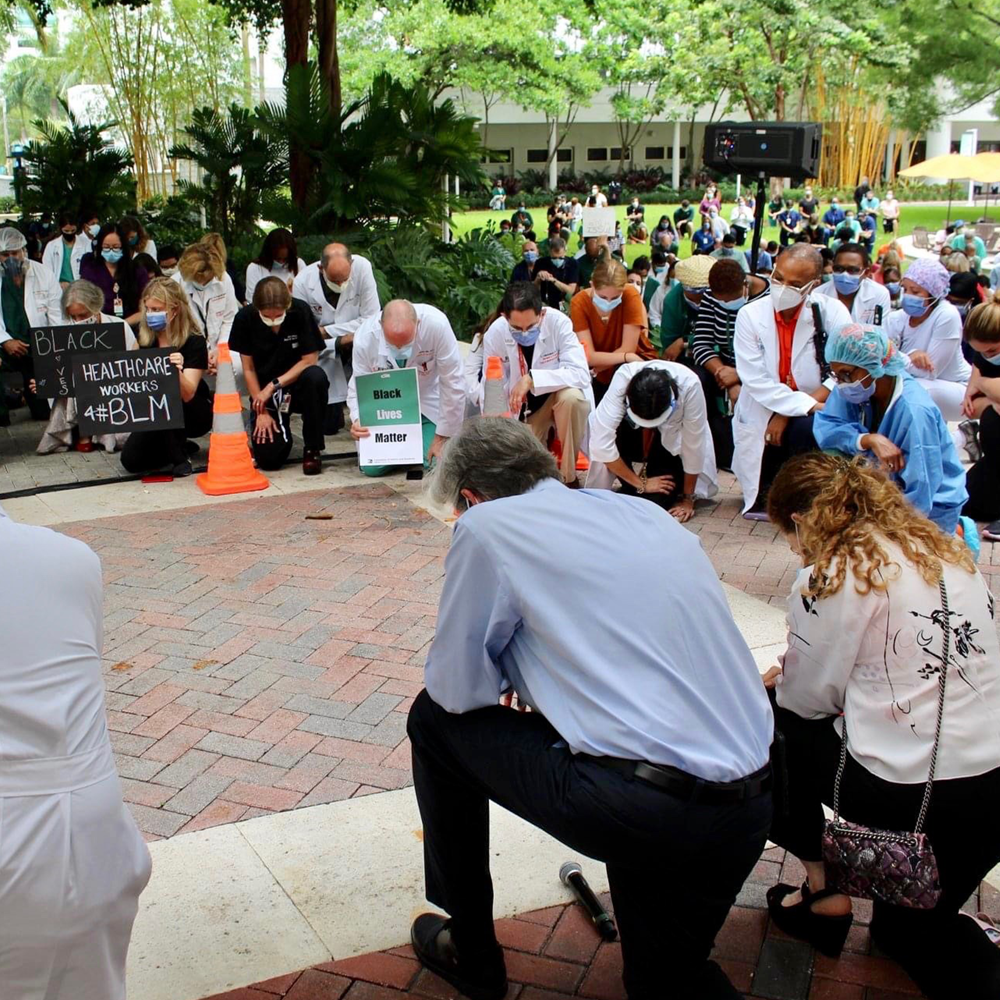A Commitment to Change
The Miller School community tackles the challenge of racial justice
By Louis Greenstein
Illustrations by Neil Webb

T
he killing of George Floyd — a Black man suffocated by white police officers during an arrest in Minneapolis on May 25 — unleashed a wave of political action across the United States and around the world. The University of Miami Miller School of Medicine was no exception. The most significant outcome was the formation of the school’s Task Force on Racial Justice, created by Dean Henri R. Ford, M.D., M.H.A., to consider ways to bring long-term, sustainable change to the medical campus. But much would take place before the task force would come into being.
Videos of the Floyd incident, which included the dying man’s pleas for mercy — “I can’t breathe” — went viral, setting off spring and summer protests punctuated by impassioned shouts of “Black Lives Matter.” Protestors called upon their elected representatives to address the disproportionate number of Black people killed by police and demand fairness in criminal justice, pay, education, housing, and health care.
“The death of George Floyd in Minneapolis has brought outraged protesters to the streets of many cities, including Miami, demanding justice and an end to police violence against Black men and women and a long-overdue correction of this country’s deep racial inequalities,” Dean Ford wrote in a June 1 message to the Miller School community. “As an African American, and the father of an African American young man who has been stopped numerous times by the police because of racial profiling, my heart aches and my despair grows beyond belief because I realize that it could have been me or my son.”
Students call for action
Dean Ford’s message was just the beginning of responses to come on the medical campus. Others began on June 4, when the dean received a call-to-action letter signed by 22 students describing incidents and conditions of racial prejudice at the Miller School.
The students’ letter followed a similar memo signed by medical students at the University of Minnesota and submitted to their dean. Second-year Miller School students Amanda Nwaba, president of the school’s chapter of the Student National Medical Association (SNMA), the Black student medical organization, and Brea Camille Willey, SNMA vice president, said the idea for the letter came out of a national SNMA meeting held shortly after Floyd’s death.
“The University of Minnesota students were compelled to write a letter from their chapter,” Willey said. “It was an empowering time to write a letter to their school, so students at a number of other schools did so, too.”
The letter from the Miller School students called for an acknowledgment of racism, wellness accommodations for systemic trauma, and curricular and cultural changes on campus. It outlined areas where medical education was falling short on racial justice.

On June 8, students, staff, faculty, and administrators took a knee in Schoninger Research Quadrangle to honor George Floyd. Photograph by Bob Siegel.
“We had a lot of action items,” Nwaba said. “But I think as a start we wanted to be able to put in words what a lot of Black students collectively feel. So many Black medical students across the country want our schools to be aware of our grievances. We want them to begin to acknowledge what we face and some of what we hope can be better in terms of our education, the culture among colleagues, and medicine in general.”
On June 8, White Coats for Black Lives, an organization of medical residents, held a kneel-in on the Schoninger Research Quadrangle during which students, staff, faculty, and administrators took a knee for eight minutes and 46 seconds — the amount of time former Minneapolis police officer Derek Chauvin pressed his knee into Floyd’s neck. Days later, a number of the medical school’s Black faculty met with Dean Ford to express their concerns about racism on campus. And additional messages from President Julio Frenk and the Board of Trustees decried institutional racism, supported the demonstrators, and committed to creating and maintaining a just and inclusive academic environment.
As the interest and energy grew, Dean Ford and the Miller School’s Office of Diversity, Inclusion, and Community Engagement (ODICE) each began holding town hall meetings that featured experts offering outside perspectives or simply allowed members of the medical campus community to share their concerns.
The task force comes to life
With these issues in mind — as well as the disparate number of people of color affected by COVID-19 — Dean Ford, in a July 1 message to the medical community, announced he was convening a task force to identify and develop actionable, sustainable strategies to address racism at the Miller School. He asked ODICE’s leaders — Roderick King, M.D., M.P.H., senior associate dean, and Nanette Vega, Ed.D., assistant dean — to take charge of the initiative. Through their town halls, both had already become deeply involved in the conversation.
“The town halls became an opportunity for the dean, Dr. Vega, and me to hear how impassioned people were,” Dr. King said.
The task force — divided into seven subcommittees formed in response to areas of concern outlined in the medical students’ letter — took on racial justice issues in admissions, student affairs, curriculum, faculty affairs, residents/fellowships, research, and community engagement.
The subcommittees submitted their recommendations to ODICE in October. Dr. King and Dr. Vega are summarizing the findings for Dean Ford’s review. These recommendations will create sustainable change throughout the Miller School.
Committed to creating change
The broad representations of faculty, students, and staff who answered the call to serve on the task force “says a lot about what can happen through collective action,” Dr. Vega said.
After Dean Ford appointed the co-chairs, he put out a call for volunteers to serve on the subcommittees. More than 350 faculty, staff, and students stepped up. This outpouring confirmed the Miller School community was committed to creating change.
“One of the subcommittees had well over 60 or 70 people asking to participate,” Dr. King said. “I was impressed by the sheer number.”
Dr. King, who does a lot of work mobilizing leaders to take aligned action, noted that typically only 10 or 20 people will volunteer to sit on a subcommittee — and that their interest tends to wane once the real work begins. But not these subcommittees, which broke down into smaller work groups to read relevant articles, share knowledge and experience with other institutions, send out surveys and review the responses, and talk with members of the UM community.
“I’ve been inspired by their level of commitment,” Dr. Vega said. “This is above and beyond their daily work. Subcommittee members include clinicians who meet early in the morning before clinic and at night after a full day of work. They are giving up their lunch hours, and they are doing work on the weekends. They are committed to creating the change that they want to see at the Miller School.”
The power structure of a medical school could discourage students from becoming involved, but this task force is different, Dr. Vega said, “because it has the blessing of the Board of Trustees, the president, and the dean. It is truly a working group where faculty, students, and staff all feel like they have a platform.”

Dr. Vega noted that students are the most vocal members of the subcommittees — especially around curriculum, student services, and admissions. The dean selected co-chairs who are respected faculty doing meaningful work in our community, she added.
In the run-up to the task force’s formation, Dr. King noted there were statements floating around from virtually every medical school in the country. He, Dr. Vega, and Dr. Ford also had informal discussions with alumni from their alma maters, some of which were establishing committees and issuing statements on racial justice. Additionally, the Miller School belongs to national associations and consortia that exchanged information on best practices. The communications with other institutions helped shape the thinking around how the task force would operate.
An early look at the recommendations
While the subcommittees’ recommendations and their proposed budgets and timelines for implementation are still under review, Drs. King and Vega discussed what they’ve been hearing from the co-chairs.
Admissions will employ both short- and long-term strategies. One of the latter recommendations is a pipeline program known as “Miami Forever” to incentivize students to complete their residencies at the Miller School and ultimately join the faculty. The admissions subcommittee is also looking at acceptable MCAT scores at peer institutions to determine whether lowering the threshold would impact diversity without negatively affecting academic standards.
“The student affairs subcommittee is expanding the definition of mental health to address racism as a mental health issue on campus,” Dr. Vega said.
The subcommittee is also recommending the school hire more psychiatrists and psychologists who identify as Black or African American.

“We need to do better,” she added.
The curriculum subcommittee reached out to Boston University for ideas about integrating racism issues into a curriculum, and they’re looking into creating a curriculum bias review committee. The subcommittee searched literature from the past 10 years related to racial justice in curriculum innovation. They read hundreds of articles on best practices, and they watched videos about what an anti-racism curriculum looks like.
The big push from the faculty affairs subcommittee is an effort to recruit and retain minority faculty, particularly Black faculty. Predating the task force, the school was already conducting training on racial equity. The Department of Faculty Affairs will be launching this training under the auspices of the task force to raise general awareness about racism and bias.
The subcommittee on residents and fellowships worked on strategies for making UM more welcoming to residents and fellows of color and recruiting more from that population.
The research subcommittee is trying to improve on racial equity-focused research and increase the pipeline of minority researchers.
“There’s no Black Ph.D. faculty in the basic science departments in the medical school,” Dr. King noted.
He added that out of around 1,500 faculty members, there are just three Black tenured faculty in the Miller School — and Dean Ford is one of them.
The community engagement subcommittee is developing strategies to improve policing on campus by addressing the profiling of residents, students, and fellows by both the campus police and the Miami-Dade police. A second effort involves getting the institution more integrated into the community — “building pipelines of trust,” as Dr. King put it. This could involve the medical school making a commitment to hire more people from the community and sign more vendor contracts with local businesses.
A commitment of resources
There is no question about racial injustice or the sluggish response to it in America’s classrooms, courtrooms, and businesses — and the need for change.
“The university has committed resources to make this happen,” said Dr. Vega.
Those resources will be permanent.
“The task force is not a one-off thing — the group won’t disappear,” Dr. King said, adding it will be part of the Dean’s Diversity Council. “The goal is to get it to a point where five years later people look back and go, ‘Oh yeah, we always did it that way’— even though it wasn’t always done that way.”
Since several subcommittee co-chairs are deans, they’re already implementing some of the recommendations, including beginning to look at racism as a mental health issue.
“The task force will continue to be engaged in the work,” Dr. Vega said. “After the recommendations are made to Dean Ford and the Board of Trustees, the work is going to continue to happen within the Dean’s Diversity Council.”
There will be ongoing opportunities to engage task force members in small working groups as the recommendations are implemented and tracked over time.
“The tracking and measuring piece is important,” Dr. Vega added. “There will also be an institutional scorecard so we can track our progress. If you can’t measure it, you can’t improve it.”
The Miller School’s Task Force on Racial Justice is committed to making a real, permanent difference.
“If we’re not changed as an institution as a result of what is going on in our world, then we will have failed,” Dr. Vega said.
Dr. King notes that Dean Ford reminds his faculty, staff, and senior leadership regularly that failure is not an option.![]()


